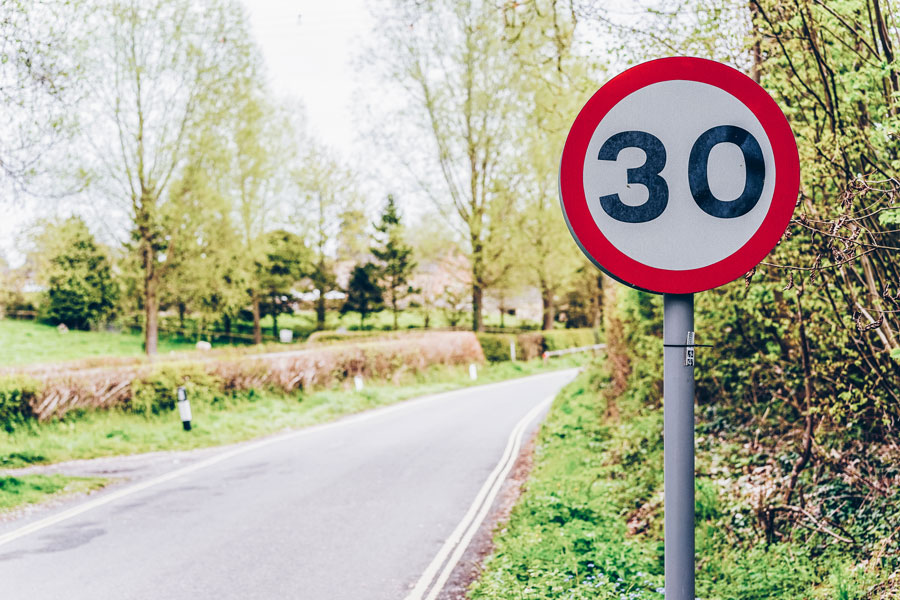Take a look: According to a recent online survey by the market research company YouGov, more than 50 percent of Germans are in favour of a 30 speed limit in city centres. That really hits home, doesn't it? But, as is often the case, it's worth taking a second look at the topic of "30 speed limit in built-up areas".
Back in 2012, Germany's Green party, together with the SPD party, announced that they would impose a 30 speed limit as standard in all cities if they won the parliamentary elections. It wasn't to be: CDU, CSU and SPD agreed on a coalition government. The Green party lost a significant number of votes and were left out in the cold. Another parliamentary election will take place in September. And since there has been significant hype around the Green party since the last election, the topic of "30 speed limit" is suddenly current once again.
30 speed limit in the Green party's election campaign
In the preliminary election programme, the Green party states clearly: "To improve safety on the roads, we want to reverse the rule/exception ratio in built-up areas. The 30 limit would be the rule, deviations such as a 50 limit will be indicated with signs." The topic of the 30 speed limit is also being discussed again on municipal/regional level. The Green party is requesting support from the North Rhine-Westphalia region in the NRW state parliament, for example: "In consultation with the German government, the goal is to enable municipalities to impose a standard limit of 30 in pilot test, such as in Aachen or Bonn.": Main roads are to be excluded from this.
Environmental protection and increased safety on the roads are goals that are always worth fighting for. But how useful is a general speed limit of 30 km/h in reality?
The ADAC collected facts and arguments in its brochure "Tempo 30 - Pro & Contra" (30 speed limit - for & against). The conclusion of the automobile association: 30 limit zones have proven effective in residential areas. "Imposing a 30 speed limit in front of schools or nurseries along main roads can also be an useful measure."
30 speed limit and safety
But one thing at a time. Let's first look at the aspect of safety: At a speed of 30 mph, the stopping distance during brake manoeuvres is, of course, significantly reduced. "The reduced impact speed can help to reduce the severity of accidents in the event of a collision", the ADAC is convinced. "For road safety reasons, a 30 limit in residential areas is always effective." There aren't many people who would disagree with this.
30 limit and environmental protection
It's a very different story when it comes to environmental protection. Because there are hardly any clear studies into situation regarding air pollutants. The main issue is that the results are usually not comparable. We all know that there are studies where the measured emissions in 30 limit zones are higher than in 50 limit zones, which goes against expectations. This is due in particular to the frequently complex situations and conditions in the specific areas, which can often not be compared with other locations.
Traffic light density and coordination have an impact on emissions, for example, as the ADAC highlights. "Reducing the permissible maximum speed from 50 km/h to 30 km/h will even lead to an increase in emissions on main roads with well coordinated light signal systems."
30 limit and travel time
One thing is clear: A general speed limit of 30 km/h, particularly on the main traffic arteries of the inner-city road network, will significantly increase travel times. The ADAC fears that this will affect "low traffic times, such as Sundays, holidays and night time" in particular. Another problem according to the ADAC: A 30 limit on main roads would lead to increased evasion traffic and undesired consequences.
Anyone who listens the arguments of advocates and opponents of the standard 30 limit in built-up areas and who also applies some common sense can't help but ask: Would we really benefit from a general maximum speed or a standard speed of 30 km/h? It's worth taking a look abroad in Europe: Spain imposed a 30 limit in all cities in May 2021, a 30 limit has been in place in Brussels since the start of the year. But for both countries it's still too early to draw any conclusions.
Let's return to the majority in favour of a 30 limit in city centres mentioned earlier. Although this may seem extremely clear at first glance, it actually isn't on closer inspection. Only 23.5 percent of those in favour of the limit would support a nationwide and permanent speed restriction. Slightly over 19 percent would support a speed limit for a limited period of time and the majority (23.6 percent) is only in favour of local limits.

